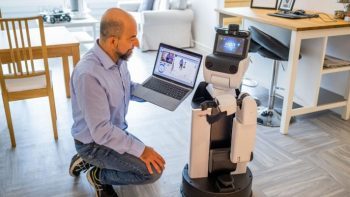The National Robotarium is pioneering intelligent sensing and tele-presence robotic tech to allow health practitioners to remotely assess a person’s physical and cognitive health from anywhere in the world.
Hosted by Heriot-Watt University, the Robotarium’s assisted living lab believes this will aid cost-effective diagnosis, more regular monitoring and health assessments alongside assistance, especially for those living with conditions like Alzheimer’s disease and other cognitive impairments.
The system was demonstrated for the first time to the UK Government Minister, Iain Stewart during a visit to the National Robotarium’s construction site.
Research lead Dr Mauro Dragone, from the National Robotarium, explained: “With gaps between assessments lengthening, the care and support that is being prescribed to assist vulnerable people may become unsuitable as an individual’s physical and cognitive abilities change over time.
“Our prototype makes use of machine learning and artificial intelligence techniques to monitor smart home sensors to detect and analyse daily activities.
“We are programming the system to use this information to carry out a thorough, non-intrusive assessment of an older person’s cognitive abilities, as well as their ability to live independently.”
Combining the system with a tele-presence robot brings two major advances: Firstly, robots can be equipped with powerful sensors and can also operate in a semi-autonomous mode, enriching the capability of the system to deliver quality data, 24 hours a day, seven days a week.
Secondly, tele-presence robots keep clinicians and carers informed and providing benefits from the data provided by the project’s intelligent sensing system. Additionally, they can control the robot directly, over the Internet, to interact with the individual under their care.
They can see through the eyes of the robot, move around the room or between rooms and operate its arms and hands to carry out more complex assessment protocols. They can also respond to emergencies and provide assistance when needed.
The project has been conducted in collaboration with Dr Mario Parra Rodriguez, an expert in cognitive assessment from the University of Strathclyde.
Rodriguez, talking about the potential impact of the technology, said: “The experience of inhabiting a distant robot through which I can remotely guide, assess, and support vulnerable adults affected by devastating conditions such as Alzheimer’s disease, grants me confidence that challenges we are currently experiencing to mitigate the impact of such diseases will soon be overcome through revolutionary technologies.”
The research facility is part of the Data-Driven Innovation initiative and is supported by £21 million from the UK Government and £1.4m from the Scottish Government through the £1.3bn Edinburgh and South East Scotland City Region Deal – a 15 year investment programme jointly funded by both governments and regional partners.
Source: DIGIT

